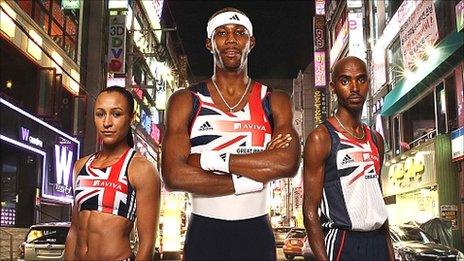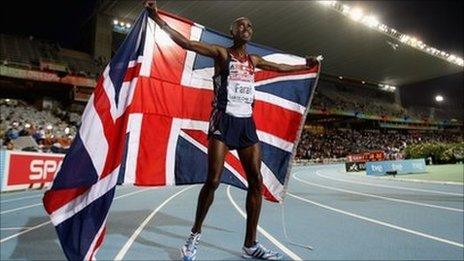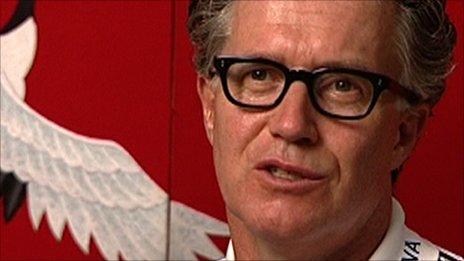World Athletics 2011: Edna Kiplagat takes first gold
- Published

Ennis, Idowu and Farah are all gold medal hopes for Britain in Daegu
The World Athletics Championships in Daegu have begun with Kenyan athlete Edna Kiplagat claiming the first gold medal in the women's marathon.
Policewoman Kiplagat encountered a false start and a fall at a drinks station but recovered to win ahead of compatriots Priscah Jeptoo and Sharon Cherop in a time of two hours, 28 minutes and 43 seconds.
Saturday's morning session began well for Britain, Barbara Parker making it through the 3,000m steeplechase heats and Andrew Osagie qualifying comfortably from his 800m heat, although European silver medalist Michael Rimmer, struggling with injury, went out.
Steve Lewis also qualified for Monday's pole vault final as his training partner, Australia's reigning champion Steve Hooker, crashed out after three failures at 5.50 metres.
Two years ago in Berlin a British team weakened by injury brought home six medals, including two golds and 11 personal bests - the country's best return since 1999.
But this time head coach Charles van Commenee wants at least one more from his 66-strong squad, external, with the reigning world champions Jess Ennis and Phillips Idowu joined by Mo Farah and Dai Greene as genuine contenders for gold.
Giant posters of Ennis are everywhere in the city of Daegu, dwarfed only by those featuring the biggest star the sport of athletics has ever seen: Usain Bolt.
Bolt begins his title defence at 1425 BST in heat six - where he runs alongside Britain's Dwain Chambers.
Injuries to Tyson Gay, external and Asafa Powell, external may have robbed Sunday's 100m final of the rivalry track and field fans so desperately wanted to see, while Bolt's form this year means we are unlikely to witness a repeat of his flabbergasting, record-breaking 9.58 seconds in Berlin, external.
Ennis inspired by British legends
But as the hundreds of Korean girls who greeted his appearance in a city mall with Beatlemania screams demonstrated, the fastest man in history has an impact like no other. For Bolt to fail to repeat his 100m/200m sprint double of the last two major championships would be a shock of global proportions.
In his shadow, better rivalries may come from Liu Xiang, David Oliver and Dayron Robles in the 110m hurdles, as well as Sanya Richards-Ross, Allyson Felix and Amantle Montsho in the women's 400m.
Younger stars may emerge in the shape of Grenada's 18-year-old 400m sensation Kirani James, coming names like David Rudisha and Carmelita Jeter may imprint themselves on the sporting world outside athletics even as old rogues like Justin Gatlin and LaShawn Merrit return from drugs bans to remind the sport of the problems it faces.
For the British team it is all about delivering on form and potential.
If Van Commenee's talk of a 'golden generation', external to match that of Sebastian Coe, Daley Thompson and Tessa Sanderson at the 1984 Olympics is a little unfair - the Los Angeles Olympics were a Games denuded by the Eastern Bloc boycott, the athletics world of 2011 far more competitive across all events - the irascible Dutchman's talk reflects a growing sense of optimism about British prospects a year out from the London Olympics.
Since taking her first global heptathlon title in Berlin, Ennis has produced an overall personal best in all three of her subsequent big championships, winning them all in style that makes her clear favourite again when her two-day competition begins on Monday.
Farah will line up for Sunday's 10,000m as the best distance runner in the world this year, and while Greene will have to beat four closely-matched rivals to claim the 400m hurdles crown, Idowu's already excellent prospects - he set personal bests in winning triple jump gold at both the 2009 Worlds, external and 2010 Europeans, external - are boosted by the absence through injury of his main threat, Frenchman Teddy Tamgho.
"This is a World Championships, and they're all in this to be the best in the world," says Van Commenee simply.
"I expect from Jess to be the same old Jess, who is a very stable and consistent performer. She is in very good shape, and she is the type of person who can handle the expectations.
"For Mo, concerned is not the right word, but being in that position for perhaps the first time is quite a challenge for him.
"No British athlete in history has won a 5,000m or 10,000m at a global level, so it's not easy, but he knows that. If he wins that would be massive.
"I consider Dai to be one of the five athletes who can win the 400m hurdles, and he's similar to Jessica - a very stable personality, and that's very helpful in an arena when it's man on man and head to head.
Athletics boss targets seven World Championships medals
"And for Phillips, we have seen that often in the past he hasn't had a great last rehearsal. But he is an awesome competitor when it really counts, and he is in great shape. I'm sure he can do this."
The mood in the camp is buoyant, the atmosphere stoked by a rousing speech given by team captain Christian Malcolm.
"I spoke about the time I was ill before competing in Athens [in 2004[ and I spoke of the Olympics in 2000 when John Capel was the favourite in the 200m," said Malcolm, whose words were given a standing ovation by his team-mates.
"In the final he was in lane four, I was in lane three and I was just going to track him, only he stumbled at the beginning. I went past him in the first two steps and hesitated, which I shouldn't have done, and finished fifth and missed out on a medal by 0.02 seconds.
"I said to the guys, 'Don't go in there giving your competitors too much respect. Because you go in there ranked maybe 20th or 30th in the world doesn't mean you can't be ranked top eight, top five, top three.
"You have to go out there and perform, have a plan and stick to it. Don't let anyone take you off it'.
"Anything can happen, the favourites don't always win and we don't always have to put the number one ranked competitor on a platform and say they are the best in the world.
"We have to go out there and be competitive against these guys."
- Published26 August 2011
- Published26 August 2011
- Published25 August 2011

- Published4 September 2011
- Published25 August 2011
- Published23 August 2011

- Published10 September 2015
